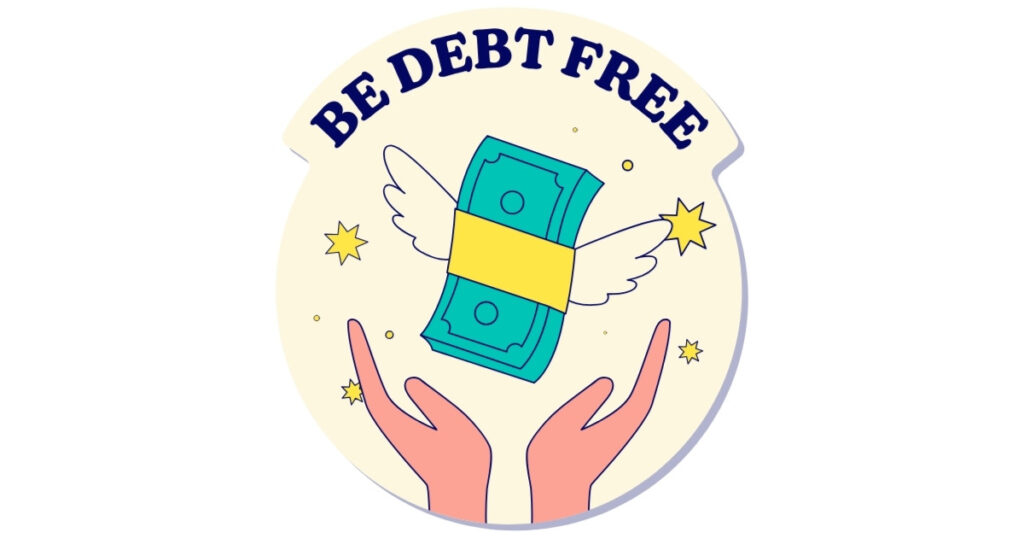
Achieving a debt-free status is a significant milestone in personal finance. Living debt-free doesn’t just relieve financial stress; it paves the way for a future filled with financial security and opportunities. In this comprehensive guide, we will explore the long-term benefits of being debt-free, offering insights into how eliminating debt can positively impact various aspects of life.
What is Debt-Free Life?
Living a debt-free life means managing your finances in a way that eliminates all outstanding debts. It’s a financial state where you no longer owe money to creditors, including credit cards, student loans, mortgages, or personal loans. The goal of a debt-free life is not just about avoiding debt but also achieving financial freedom and security.
10 Benefits of Being Debt-Free
1. Financial Freedom and Flexibility
One of the most significant benefits of being debt-free is the enhanced financial freedom it provides. Without monthly debt payments, individuals have greater control over their finances, allowing them to allocate money towards savings, investments, or personal interests. This flexibility can lead to a more fulfilling and less stressful financial life.
2. Improved Credit Score
Maintaining a debt-free status often results in a higher credit score. A good credit score is crucial for securing favorable loan terms, lower interest rates, and better insurance premiums. It also provides greater access to credit when needed, with fewer penalties or higher costs associated with borrowing.
3. Increased Savings Potential
When you are debt-free, you can redirect the funds previously used for debt payments into savings and investments. This shift enables you to build an emergency fund, save for retirement, or invest in opportunities that can enhance your financial future. Over time, these savings and investments can significantly increase your wealth.
4. Reduced Stress and Improved Mental Health
Debt can be a major source of stress and anxiety. Achieving a debt-free status can lead to improved mental health by reducing financial worries. The relief from constant debt pressure allows individuals to focus on other aspects of their lives, contributing to overall well-being and happiness.
5. Enhanced Life Opportunities
Being debt-free opens up new opportunities for life choices that may have previously been restricted by financial constraints. Whether it’s pursuing higher education, starting a business, or taking a dream vacation, financial freedom allows you to explore and seize opportunities without the burden of debt.
6. Stronger Financial Planning and Goals
Without debt, individuals can focus on setting and achieving financial goals with greater ease. Planning for significant expenses, such as buying a home or funding education, becomes more manageable. A debt-free lifestyle enables better financial planning and goal setting, leading to more structured and achievable financial objectives.
7. Ability to Build Wealth
Eliminating debt is a crucial step toward building wealth. With more disposable income available, individuals can invest in assets that appreciate over time, such as real estate or stocks. A debt-free status allows for a more strategic approach to wealth accumulation and financial growth.
8. Greater Security and Stability
Financial stability is a key benefit of being debt-free. Without the strain of debt repayments, individuals can more effectively manage unexpected expenses and financial emergencies. This stability provides a sense of security and confidence in handling life’s uncertainties.
9. Freedom from Financial Constraints
Being debt-free means that you are not tied down by monthly debt obligations, which can limit your financial decisions and lifestyle choices. This freedom allows you to make choices based on personal preferences and priorities, rather than being constrained by financial limitations.
10. Setting a Positive Example
Maintaining a debt-free lifestyle can serve as a positive example for others, particularly younger generations. Demonstrating the benefits of responsible financial management and debt elimination encourages family and friends to adopt similar habits, fostering a culture of financial health and responsibility.
How to Encourage Your Children to Live a Debt-Free Life
Teaching your children to live a debt-free life from a young age sets them up for financial success and stability in the future. Encouraging good financial habits early on can help them understand the importance of managing money wisely and avoiding unnecessary debt. Here’s how you can guide your children toward a debt-free life:
1. Start with Financial Education
Introduce your children to basic financial concepts as early as possible. Explain what debt is and how it works, emphasizing the difference between good and bad debt. Use age-appropriate resources such as books, educational games, and interactive apps to make learning about money engaging and fun.
2. Teach the Value of Saving
Encourage your children to save money by setting up a savings account for them. Show them how to set financial goals and work towards them. For example, if they want a new toy or game, help them create a savings plan to achieve their goal. Teach them the importance of saving a portion of their allowance or earnings from chores before spending.
3. Set a Good Example
Children often model their behavior after their parents. Demonstrate responsible financial practices by managing your own money wisely. Avoid unnecessary debt, use credit cards responsibly, and discuss your financial decisions with your children. Seeing you handle money effectively will reinforce the importance of living a debt-free life.
4. Encourage Budgeting
Help your children create and stick to a budget. This can start with something simple, like tracking their weekly allowance or money received as gifts. Teach them how to allocate funds for saving, spending, and giving. By understanding how to budget, they will learn to manage their money more effectively and avoid overspending.
5. Discuss the Risks of Debt
Explain the potential pitfalls of debt, such as high interest rates and the impact on their financial future. Use real-life examples to illustrate how debt can accumulate and become challenging to manage. Teach them about the consequences of not paying off credit cards or loans, and how it can affect their credit score and financial health.
6. Promote Financial Goals
Encourage your children to set and work towards financial goals. Whether it’s saving for a special purchase or planning for a future event, having goals can motivate them to manage their money wisely. Celebrate their achievements and discuss how reaching their goals without accumulating debt feels rewarding and empowering.
7. Teach Delayed Gratification
Help your children understand the value of waiting for something they want. Encourage them to save up for larger items rather than buying on impulse or using credit. Teach them that waiting and saving for something they really want can be more fulfilling than instant gratification.
8. Provide Opportunities for Earning Money
Give your children opportunities to earn their own money through chores, babysitting, or small jobs. Earning money can help them understand its value and the effort required to earn it. This experience can also teach them about budgeting and saving, reinforcing the importance of living within their means.
9. Encourage Smart Spending
Teach your children to make thoughtful purchasing decisions. Discuss how to compare prices, look for deals, and avoid unnecessary expenses. Help them understand the difference between needs and wants, and make sure they know it’s okay to say no to impulse buys.
10. Support Their Financial Independence
As your children grow older, encourage them to manage their own finances, including a part-time job or managing their own bank account. Support their efforts to budget, save, and spend wisely. Offer guidance and advice, but allow them to make their own financial decisions and learn from their experiences.
Conclusion
The journey to becoming debt-free is a transformative process that offers numerous long-term benefits. From financial freedom and improved credit scores to increased savings potential and reduced stress, the advantages of a debt-free lifestyle are substantial. Embracing a debt-free approach not only enhances your financial well-being but also opens doors to a more fulfilling and secure future.
Frequently Asked Questions
1. What are the first steps to becoming debt-free?
Begin by assessing your debt, creating a budget, and prioritizing payments. Consider debt consolidation or negotiation if needed.
2. How does being debt-free affect my credit score?
It improves your credit score by reducing your credit utilization ratio and demonstrating financial responsibility.
3. Can I still build wealth if I have existing debt?
Yes, but managing debt while saving and investing is crucial. Prioritize paying off high-interest debt to free up funds for wealth-building.
4. What are some strategies for staying debt-free?
Create a budget, live within your means, save regularly, and avoid unnecessary debt. Maintaining financial discipline is key to staying debt-free.
5. How can I teach my children about the benefits of being debt-free?
Lead by example, involve them in budgeting and saving activities, and discuss the importance of responsible financial management.
Thank you for taking the time to explore the long-term benefits of a debt-free lifestyle. We hope this guide has provided valuable insights and motivation for your financial journey. For more informative articles on personal finance and financial well-being, be sure to check out our other resources.


